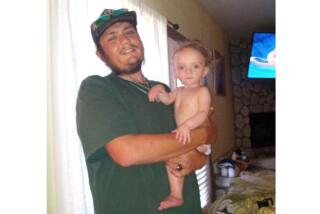Rothenberg Gets 7 Years, 4 Months
SAN FRANCISCO — A Superior Court judge here Friday sentenced Charles Rothenberg to seven years and four months in prison, a term that the man who gained notoriety for setting his son afire will complete in just 18 months.
San Francisco Dist. Atty. Kamala Harris immediately vowed to appeal the ruling, arguing that Rothenberg should be re-sentenced to life in prison under the three-strikes law.
At issue is whether the attempted murder and arson convictions that stemmed from Rothenberg’s March 3, 1983, attack on then-6-year-old David constitute one strike or two.
Prosecutors believe Rothenberg committed multiple crimes at a Buena Park motel that night. They therefore pursued the current case -- felony possession of a loaded .38-caliber revolver and 44 extra rounds of ammunition -- as a third strike, hoping to lock the 64-year-old Rothenberg up for life.
The heinous nature of his Buena Park crimes, coupled with a criminal history stretching back to 1958, made him a perfect candidate for three-strikes sentencing, they contended.
But despite Judge Cynthia Lee’s assessment of Rothenberg as the type of remorseless repeat offender for whom the three-strikes law was designed, Lee said she was compelled to erase one of the past “strikes” because his motive for the arson appeared to be killing David, making his criminal acts one and the same.
“I want to know what the separate acts are with the multiple objectives,” she prodded Assistant Dist. Atty. Cheryl Matthews on Friday after granting the prosecutor’s request to reopen the issue, on which Lee had already ruled Thursday afternoon.
But Lee ultimately stuck to her initial interpretation and sentenced Rothenberg, who legally changed his name to Charley Charles in 1998, to the maximum allowable sentence for a defendant with one prior strike.
“We respectfully disagree with the judge,” said Harris, a proponent of three-strikes reform who is deviating from liberal San Francisco tradition by pursuing a third strike for a nonviolent offense. “It is, on the facts of it, an appropriate case for a higher court to review and perhaps resolve or make finer points around the issue of what can be defined as separate acts.
“We believe that Rothenberg had the intent to, one, kill the child and, two, destroy the evidence by setting the place on fire,” she said. “He certainly almost accomplished the first and accomplished the latter. For that reason, he is culpable of more than one crime.”
Rothenberg, meanwhile, awaits trial on separate charges of credit card fraud and mail theft. But even if he gets a maximum sentence on those charges, he would serve only a one-year enhancement to his current sentence because he has been jailed since his arrest in 2001.
Rothenberg served less than seven years in prison after pleading guilty to arson and the attempted murder of David, who was badly disfigured. That was followed by three years of parole under then-unprecedented round-the-clock guard in the Oakland area.
The part-time waiter was later arrested, tried and acquitted of attempted murder. He moved to San Francisco, where he purchased the gun from a bartender in 1998 -- a felony for a convicted felon.
He was initially investigated for setting a fire in front of a neighbor’s door in an act allegedly linked to one of the pending fraud cases. A grand jury declined to indict him on an arson charge.
At his weapons possession trial, Rothenberg was portrayed by Deputy Public Defender Gabriel Bassan as a remorseful man eager for a fresh start but hounded by threats from vigilantes who forever labeled him “baby burner.”
For that reason, he had no choice but to arm himself, Bassan contended in an unusual “necessity defense.”
But there was no evidence presented at trial of any specific threat. And in sentencing Friday, Lee made it clear that she -- like the jury -- didn’t buy it.
“The court did not find the testimony of the defendant to be credible in the least,” she said, adding later that Rothenberg expressed no remorse when he told investigators about his loaded gun.
Rothenberg, now gray-haired and balding with a slight limp, blinked often and stared straight ahead as Lee spoke. But he showed little emotion. When Lee asked if he understood his rights, he spoke so inaudibly that she had to prod him to raise his voice.
The father shocked the nation in 1983 when he sedated his son after a custody dispute, then poured kerosene on the sleeping David’s bed and in the motel room, ignited it and fled, locking the door behind him.
Bassan portrayed his client as a man hounded by that one admittedly inexcusable act of insanity, one that stemmed from his love for his son.
But Lee pointed out repeatedly that Rothenberg’s criminal record dates to 1958 and contains a long list of felonies, including larceny, forgery, weapons possession and attempted robbery in four states.
More to Read
Sign up for Essential California
The most important California stories and recommendations in your inbox every morning.
You may occasionally receive promotional content from the Los Angeles Times.










